#Read or die
Explore tagged Tumblr posts
Text

2K notes
·
View notes
Text
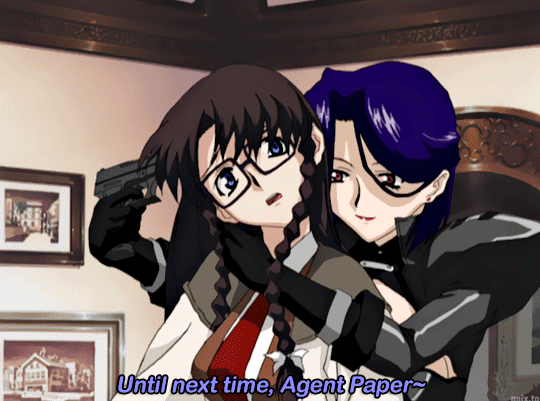


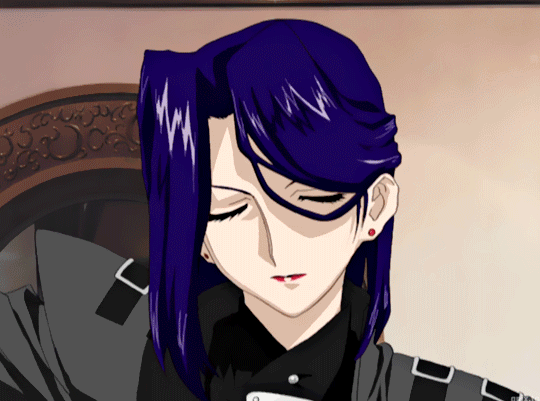

R.O.D - READ OR DIE
#what a nice couple of friends#read or die#r.o.d.#yomiko readman#nancy makuhari#oldanimeedit#animangaladies#shoujoaisource#anime#fyanimegifs#anisource#dailyanime#dailyanimatedgifs#animangahive#yuri#gif#gifset
3K notes
·
View notes
Text

418 notes
·
View notes
Text
Yuri Subtext (?) Anime List

A supplement to my earlier yuri anime masterlist, this list covers anime which aren’t marketed as yuri but which prominently feature F/F pairs, whether canonical or subtext! Since subtext is so subjective, this post only includes series which I’ve actually watched, and so is by no means intended to be comprehensive.
Also, since the above description would not cover certain series with well-known yuri pairings, I've also included a few "bonus rounds" for the curious (although these are still limited to series I have watched).
At-a-glance list:
Revolutionary Girl Utena (39 episodes + 1 movie, 1997)
NOIR (26 episodes, 2001)
Puella Magi Madoka Magica (12 episodes, 2011)
Haibane Renmei (13 episodes, 2002)
.hack//SIGN (26 episodes, 2002)
Read or Die / R.O.D. the TV (26 episodes, 2003)
Mobile Suit Gundam: The Witch From Mercury (24 episodes, 2022)
Black Rock Shooter (8 episodes, 2010)
Izetta: The Last Witch (12 episodes, 2016)
Violet Evergarden: Eternity and the Auto Memory Doll (movie, 2019)
Canaan (13 episodes, 2009)
Ga-Rei: Zero (12 episodes, 2008)
Bonus rounds:
Sailor Moon S3 (38 episodes, 1994) (subtext)
Mai-Hime (26 episodes, 2004) (canon)
Psycho-Pass (41 episodes + 3 movies, 2012) (canon)
My Next Life as a Villainess: All Routes Lead to Doom! (24 episodes + movie, 2020) (canon)
Summaries under the cut!
1. Revolutionary Girl Utena (39 episodes + 1 movie, 1997) - Anime News Network | MyAnimeList
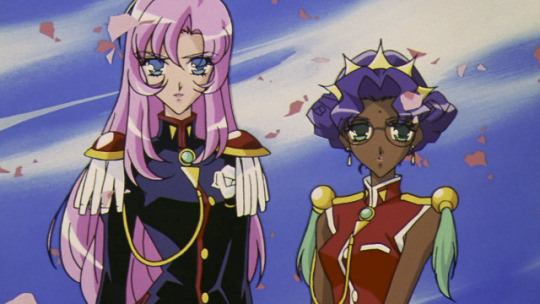
(Copied from the Yuri Anime Masterlist post, since technically it wasn’t marketed as yuri)
When she was a child, Tenjou Utena (Kawakami Tomoko) was saved by a passerby prince, so she decided that she too wanted to become a prince as an adult. Fast forward to high school, and she hasn’t forgotten that conviction: Utena gets sucked into a series of duels while trying to protect her best friend’s honour. After winning the first duel, she becomes ‘engaged’ to the eccentric “Rose Bride” Himemiya Anthy (Fuchizaki Yuriko), and the two start living together in the same dormitory.
First things first: there are a million content warnings for this series, including implied rape, sexual assault, incest, and homophobia. Although the issues are handled well (in my opinion), it does go to very dark places, so those wanting a light, fun anime to unwind to should look elsewhere. Second, this series is very much a psychological drama utilising the episodic duels as a way of hone in on Utena’s opponents and their stories, so Utena and Anthy’s relationship – though important – is definitely not the focus of the anime. Third, the TV series is limited to hinting at the romantic relationship between Utena and Anthy, not to mention that they spend most of the series being little more than acquaintances rather than actual friends. The movie Adolescence (which can be taken as a retelling or sequel, depending on your perspective) is much more explicit on this front, but also suffers from a significantly shorter runtime and a much more opaque approach to storytelling.
That being said! If you’re okay with all of the above, this series is pretty much essential. The simplistic premise belies a much more complex and nuanced story about gender roles, sexuality, and human relationships and remains one of the smartest anime ever made, over twenty years on.
2. NOIR (26 episodes, 2001) - Anime News Network | MyAnimeList
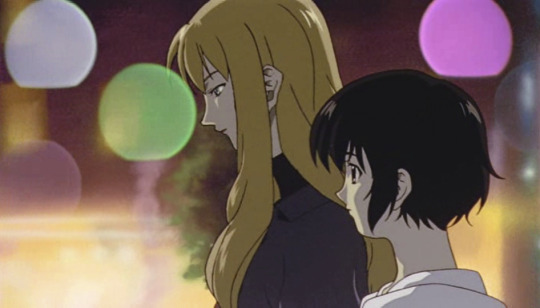
The first in anime studio Bee Train’s “girls with guns” trilogy, NOIR follows globetrotting assassin duo Mireille Bouquet (Mitsuishi Kotono) and Yuumura Kirika (Kuwashima Houko) as they partner up to search for Kirika’s missing memories and the truth behind Mireille’s parents’ deaths. The series is pleasingly restrained despite the sensational premise, alternating between “business trips” to far-flung locations and snapshots of the pair’s domestic life in Mireille’s Paris apartment, and devoting more time to the unfolding of the relationship between the prickly Mireille and puppy-like Kirika than to action sequences. I won't say too much due to spoilers, but their relationship numbers among my favorites due to how naturally it is developed throughout and how it is very much at the heart of the series both narratively and thematically.
This is also the first anime soundtrack entirely composed by the legendary Kajiura Yuki, heralding a long collaboration with director Mashimo Kouichi, and her mix of classical and modern sounds provides the perfect accompaniment to NOIR’s atmospheric cityscapes. Also, for fans of Mitsuishi’s work (Sailor Moon! Utena! Evangelion!), I’d say NOIR is a must-watch for her performance alone; her Mireille is brittle and proud, and she brings so much humanity and nuance to the role. In fact, I don’t care if you’re a fan of Mitsuishi or Kajiura or assassins or whatever, please just try the first episode— this anime deserves way more love!
3. Puella Magi Madoka Magica (12 episodes, 2011) - Anime News Network | MyAnimeList

Puella Magi Madoka Magica opens with ordinary middle school girl Kaname Madoka (Yuuki Aoi) standing in the ruins of her hometown, watching as a lone girl struggles to defend what remains of the city against a much more powerful enemy. A little rabbit-like creature informs Madoka that the girl is sure to lose without her help, and so Madoka decides to become a magical girl right then and there— at which point she wakes up and dismisses it as a strange nightmare. But then that very day, her school receives a new transfer student who looks just like that mysterious girl, and she also finds a hurt animal that closely resembles the rabbit-like creature from her dream. Madoka is then faced with certain questions: do magical girls actually exist, and will she become one herself?
Since Madoka Magica was all the rage back in the early 2010s, I don’t think it too much of a spoiler to say that the cheery first three episodes hide a dark, gritty story which uses the concept of magical girls to explore the tumultuousness of adolescence. The queer subtext only comes in at the end but tight plotting and inventive presentation make this show a quick watch— and if you’re the type who likes queerness in fiction to be intense, world-shakingly significant, and a wee bit problematic, the payoff should be more than enough. A word of warning: there is a movie sequel called Rebellion, but if you’re happy with the ending of the anime, it’s best not to watch it (although I love the movie, myself).
Side note: I won’t go into it too much due to spoilers but if you liked Madoka Magica you might want to check out Serial Experiments Lain – even if most of it is utterly incomprehensible (as it was to me), it’s worth watching until the very end (wink). Also, for the rare fan of Rebellion, Adolescence of Utena is a must-watch if you haven’t checked it out already; so much can be said about its conceptual and aesthetic influences on Rebellion!
4. Haibane Renmei (13 episodes, 2002) - Anime News Network | MyAnimeList

(Note: slight spoilers about the tone and overall themes of the show – but I think it’s necessary for the purpose of writing a more representative summary.)
Written by ABe Yoshitoshi – character designer of cult classic anime Serial Experiments Lain and author of the very unfinished manga which this show adapts and significantly develops – Haibane Renmei starts off as a light-fantasy slice-of-life anime following freshly-arrived Rakka (Hirohashi Ryou) as she searches for a suitable job in the town of Glie, before transforming into a nuanced exploration of grief and depression about halfway through. To say more would be really too spoilery, but I just want to say that this has probably the most grounded and sensitive depiction of depression I have seen in an anime; it shows that sometimes people struggle even if everyone around them is kind and supportive, but remains hopeful about the healing power of time and understanding. The subtext is between the protagonist and Reki (Noda Junko), the first person she meets, who also helps her get acclimatised to her new life in Glie. Again, I won’t say more, but their relationship really is wonderful. That being said, this show does touch upon suicide and suicidal ideation in the course of discussing these themes, so please steer clear if that is something you are wary of.
5. .hack//SIGN (26 episodes, 2002) - Anime News Network | MyAnimeList
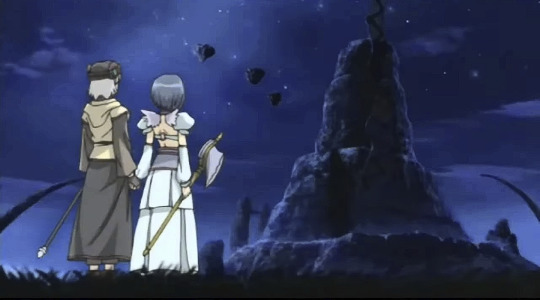
A standalone spinoff of the .hack PS2 games, this show was the most well-known anime about players getting trapped inside a multiplayer game before Sword Art Online’s arrival in 2012 (ironically, Kajiura Yuki composed the music for both). Rather than being an action-adventure story about a heroic protagonist trying to find a way back to the real world, SIGN stands out as an introspective piece, far more interested in the psychology of those who play online games and the issues of human connection and identity. In fact, the female protagonist is all too happy to remain within the MMORPG as male player-avatar Tsukasa (Saiga Mitsuki) after becoming unable to log out; the story is more about how the player grows to accept the real world with the help of the other players she meets, rather than about figuring out the exit route.
On the F/F side, some way into the series, Tsukasa makes an instant connection with fellow player-character Subaru (Nazuka Kaori) and they soon start spending a lot of time together. I really love their scenes together; the series' masterful use of body language, framing, and music all comes together to create these beautifully tender moments of intimacy. Although there’s no kiss scene nor explicit discussion of dating etc., a lot of the other characters talk about their relationship and perceive it as being romantic, to the point where one gets homophobically “worried” about Subaru when they find out that the player controlling male avatar Tsukasa is female. Tsukasa and Subaru's relationship becomes a lynchpin for both characters' development, and in general is used to illustrate the series' underlying themes in a thoughtful and heartwarming way.
6. Read or Die / R.O.D. the TV (26 episodes, 2003) Anime News Network | MyAnimeList

A spinoff of the Read or Die series which takes more from espionage thrillers and Hong Kong action flicks than shounen anime, R.O.D. the TV takes the unusual approach of starting with its main character - elite paper-maniuplating superspy Yomiko Readman (Miura Rieko) - being nowhere to be seen after burning down the British Library in a dramatic resignation announcement. Instead of focusing on her, or the spy agencies clashing in her absence, the story instead follows her friend Sumiregawa Nenene (Yukino Satsuki), who joins up with a trio of sisters with paper-manipulating powers and criminal connections in her quest to find out what happened to Yomiko. The queerness is mainly implied through Nenene's focus on Yomiko, which is unrequited and sadly fizzles out narratively speaking in the back half. Unfortunately, this is coupled with an increased focus on more heteronormative topics, such as Yomiko's grief over her dead male lover, and the child one of the characters had with the villain of the OVA. That being said, I also want to shout out this series' surprisingly earnest depiction of budding queerness in a young (like, elementary-school young) side character - something that is rare in fiction even now.
7. Mobile Suit Gundam: The Witch from Mercury (24 episodes, 2022) - Anime News Network | MyAnimeList
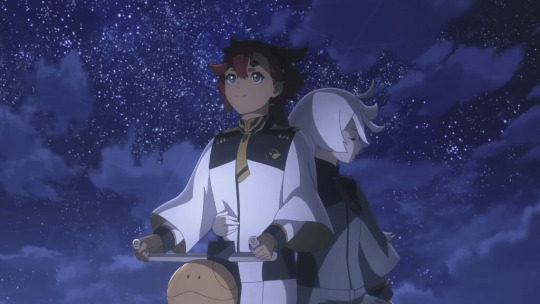
The most recent entry on this list by far (the final episode aired just a day ago at time of writing), The Witch from Mercury initially seems to forgo the Gundam franchise’s usual grand scale, being set in an academy run by the corporate giant Benerit Group. Main character and new student Suletta Mercury (Ichinose Kana) - the franchise’s first female protagonist since its beginnings in 1979 - accidentally bumbles her way into fighting a mecha duel, and, when she wins, is shocked to find that she is now engaged to the sole heiress of that self-same corporate giant, her classmate Miorine Rembran (Lynn). So far so Utena, but after the first episode, things start to diverge significantly: though the duels continue, the focus shifts to how big-picture tensions such as the manoeuvring within the Benerit Group and the conflict between the space colonisers and people on Earth play out within the student body, and how the arrival of Suletta and her mysteriously cutting-edge mecha start to shake up the status quo… until things come to an explosive head.
For those who curious about G-Witch due to Suletta and Miorine, but who wouldn’t normally be interested in Gundam or space operas, I’ll just say that if the hype has led you to expect a big queer romance where Suletta and Miorine shout their love from the rooftops, well, that’s not how it goes. It’s a mecha anime first and foremost, after all! But lower your expectations and you may be pleasantly surprised. Season 1 offers plenty to enjoy in terms of Suletta’s earnest attempts to be a good “bridegroom” and the tsundere Miorine’s bouts of jealousy over Suletta. And while their relationship takes a bit of a back seat in Season 2 due to there being So Much going on, it remains one of the key elements of the series and their scenes together are the emotional peaks of the season.
Side note: Some might criticise Gundam for taking so long to have a female main character, but let’s not forget about how the even older Ultraman (1966), Kamen Rider (1971), and Super Sentai (1975) franchises still have not had a single mainline series featuring a female protagonist… Come on guys, I’m dying for a female-led Kamen Rider over here!
8. Black Rock Shooter (8 episodes, 2010) - Anime News Network | MyAnimeList

One of the two anime inspired by the Hatsune Miku song of the same name, this Okada Mari-penned series hones in on the passionate friendships and jealousies of a group of middle-school girls. In a twist that feels informed by the psychological allegory of the popular Persona games, this interpersonal drama plays out in the surreal battle world of the music video, with the titular Black Rock Shooter being the main character’s alter-ego. Of particular interest is the first half’s focus on the blossoming friendship between protagonist Kuroi Mato (Hanazawa Kana) and her shy classmate Takanashi Yomi (Sawashiro Miyuki), which has strong overtones of two girls developing crushes on each other – it doesn’t go smoothly, but hey, that’s life.
9. Izetta: The Last Witch (12 episodes, 2016) - Anime News Network | MyAnimeList
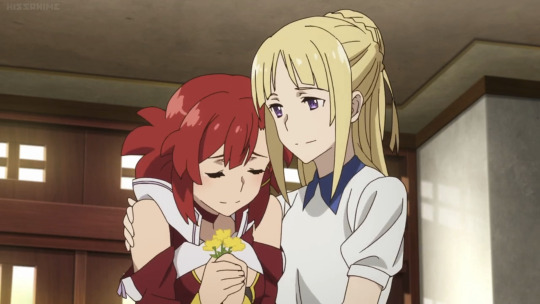
Set during what is basically World War 2, Izetta: The Last Witch asks the daring question of “What if a small European country about to be invaded by alternate-history Nazi Germany could fight back with magic… and what if it was (subtextually) yuri?” The show follows politically-minded princess Finé as she and her best friend (read: girlfriend) Izetta think up ways to leverage the latter’s witchy gifts to save the country from invasion – a rare case of a military anime where female characters are significantly involved at the strategic stage. Those who enjoy the classic princess-and-knight trope may find something to like as long as they are fine with Finé and Izetta not having much relationship development (as their dynamic is established from the start) and them not having many one-on-one scenes together (as the series’ main focus is on the political manoeuvring). Note that this show is also pretty heavy on the fanservice – IIRC there was at least one moment of egregious sexualisation per episode.
Side note: those who like Izetta may also want to check out Last Exile: Fam, the Silver Wing, a female-focused dieselpunk anime with a lot of military strategizing and a very cool world setting, though Izetta is better-paced and the main relationship is much more plot-significant. (That being said I do like the relationship between Fam side characters Tatiana and Alistair… Tatiana is probably the adult character with the most screentime in Fam, being the main characters’ commanding officer, and although it’s very background, she has this cutely settled dynamic with former piloting partner turned wife right-hand woman Alistair.)
10. Violet Evergarden: Eternity and the Auto Memory Doll (movie, 2019) - Anime News Network | MyAnimeList

(Note: this entry’s a slightly weird one, it only covers the first 40 minutes of this movie due to it being basically two episodic stories smushed together into a single package, and only the earlier story is relevant to this list.)
In this standalone spinoff of the Violet Evergarden anime series – itself an adaptation of the light novel series by Akatsuki Kana – the titular protagonist Violet (Ishikawa Yui) takes a break from ghostwriting letters to serve as companion to aloof young noblewoman Isabella York (Kotobuki Minako) in her last months of finishing school. The story is a quiet coming-of-age tale focusing on how the kind (and rather dashing!) Violet helps Isabella to open up, or, in simpler terms, it’s fodder for butler-and-lady fans. Don’t get your hopes up too much, though: Violet learning about her romantic feelings for her deceased male superior is one of the main throughlines of the anime, and this (half of the) movie also ends with a heterosexual arranged marriage for Isabella. That being said, this movie is really a feast for the eyes, its historical-fantasy setting being brought out with beautiful backgrounds and detailed linework, so it’s worth checking out if you don’t mind the very Class S narrative.
Side note: if you want F/F butler-and-lady or princess-and-knight vibes I would really recommend watching Fate/Zero for Saber and Irisviel – yes Irisviel is already married to one of the (male) main characters and yes Saber is absolutely the main love interest for the famously-straight Fate/stay night, but their dynamic is really good and Saber gets to wear a stylish suit and be all chivalrous to a woman… Please watch the third episode of season 1 at least…
11. Canaan (13 episodes, 2009) - Anime News Network | MyAnimeList
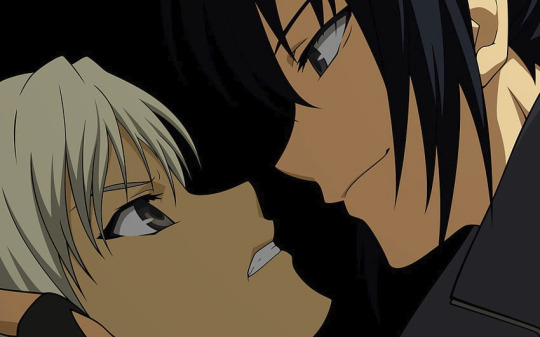
There’s quite a lot going on in Canaan – perhaps unsurprisingly so for a spinoff of the FMV visual novel 428: Shibuya Scramble, which is famous for its intertwined storylines – but in true action-movie blockbuster style, all you really need to know is that the titular mercenary Canaan (Sawashiro Miyuki) is on a hunt for her mentor’s protégé-turned-murderer, and a lot of flashy fighting is involved. Also, there's no need to worry if you haven't played the original game, as Canaan is pretty much a standalone work and all of the significant characters are original to the anime. Yuri-minded viewers may enjoy her clashes with the villain Alphard (Sakamoto Maaya), but the main source of F/F subtext is her relationship with the young photographer Maria (Nanjo Yoshino), for whom she cares deeply and must rescue on multiple occasions. However, do be warned that the one canonically queer character in the show – Alphard’s subordinate Liang Qi (Tanaka Rie), who is fixated on her boss – is handled very badly, being portrayed as a raving predatory lesbian who is mocked, rejected, and finally killed by the object of her affections. Canaan and Maria’s relationship is also framed very definitively as friendship by the end of the series, although they don’t get paired off with male characters. IIRC there’s also some fanservice but I can’t remember the details as it was a long time ago, sorry.
12. Ga-Rei: Zero (12 episodes, 2008) - Anime News Network | MyAnimeList
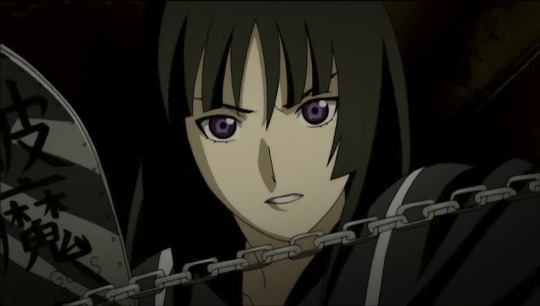
Back in the old days, I had heard this show talked about in the same breath as yuri classics such as Kannazuki no Miko and Mai-Hime, and, well, like those series it comes with significant caveats (though thankfully there is no sexual assault). Although it’s a prequel to the Ga-Rei manga by Segawa Hajime, the anime is basically standalone and focuses on original characters Kagura (Chihara Minori) and Yomi (Mizuhara Kaoru), the latter of whom welcomes protagonist Kagura into her family and demon-hunting squad, only to leave the team in a devastating betrayal. After the explosive opening, the series jumps back to explore the events leading up to that point; fans of director Aoki Ei’s work on Fate/Zero should note that the dark tone disappears in the third episode and never quite comes back even when things get serious. Viewers should also keep their F/F expectations in check, since despite the premise I would say the series is more plot- than character-focused, and on top of that a significant amount of time is devoted to Yomi’s relationship with her male fiancé (Yomi and Kagura have more screentime together, but there’s not much development whereas Yomi and her fiancé are given a whole romantic arc). There is one very fanservicey scene between Kagura and Yomi in a car early on (in episode 3?) which viewers may want to skip, but IIRC it’s an outlier and the rest of the series is nowhere near as bad.
Bonus Rounds
1. Sailor Moon S / Season 3 (38 episodes, 1994) (subtext) - Anime News Network | MyAnimeList
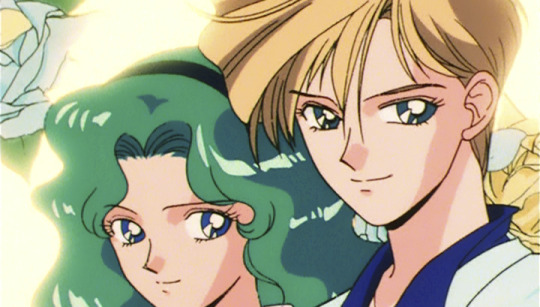
Possibly the most widely-known F/F couple in anime, Haruka and Michiru (Ogata Megumi and Katsuki Masako, respectively), make their first appearance in episode 3 of the third season as mysterious newcomers who refuse to work alongside the Sailor Senshi. Apart from being consistently framed as an ideal couple throughout (they practically cruise to victory in a couple’s contest in episode 5 of S3), they also get some juicy narrative moments, being the main subject of the excellent episodes 17 and 21 – the latter being the mid-season climax. They return in S5 but I haven’t watched that season yet.
Side note: Utena fans may be particularly interested to hear that the aforementioned Haruka-and-Michiru-centric episodes 17 and 21 are helmed by key Utena creatives. Both were written by Enokido Yoji, Utena's lead scriptwriter, while episode 17 was directed by Igarashi Takuya (who storyboarded 5 Utena episodes) and episode 21 was directed by Utena director Ikuhara Kunihiko himself.
2. Mai-Hime (26 episodes, 2004) (canon) - Anime News Network | MyAnimeList
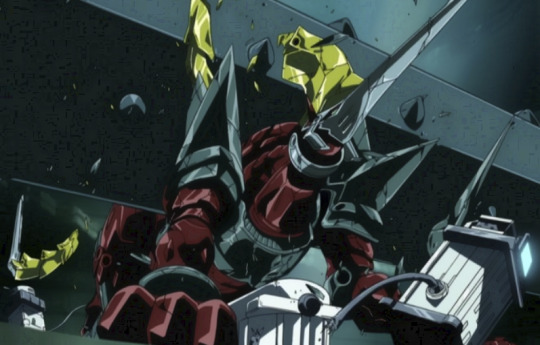
Way back when, Mai-Hime was very popular among yuri fans for including a canonically queer female character who was in love with another female character… even though, like in Kannazuki no Miko which was broadcast the same year, she commits sexual assault against her. For those still curious, Mai-Hime starts out as a quirky fighting-monsters-and-going to school anime but turns into a battle royale where characters fight each other using robots – the twist being that the robots symbolise their love for the person most precious to them, and if destroyed, that person will die. The queer storyline comes in only in the last quarter or so, but is compellingly told and at least the queer character isn’t quite as maniacal or otherwise demonised compared to some others (looking at you, Liang Qi in Canaan). It's a fun reveal, so I won't spoil it here even if you're likely to have heard of it already.
3. Psycho-Pass (41 episodes + 3 movies, 2012) (canon) - Anime News Network | MyAnimeList

Psycho-Pass is set in a dystopian world where people are rated on their criminal tendencies; the main characters’ job as police officers is to arrest those whose tendencies exceed a certain level. The F/F is canon but very, very background; one of the surprise twists of the finale is that forensics expert Karanomori Shion (Sawashiro Miyuki), whose appearance screams “sexy doctor character” but is played with surprising warmth by Sawashiro, is actually in a relationship with seemingly aloof field officer Kunizuka Yayoi (Itou Shizuka). I only watched the first season and so can’t comment on the rest, but apparently they are still in a relationship in the third season.
4. My Next Life as a Villainess: All Routes Lead to Doom! (24 episodes + movie, 2020) (canon) - Anime News Network | MyAnimeList
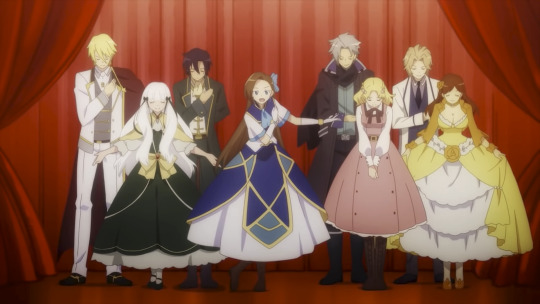
An adaptation of Yamaguchi Satoru’s popular light novel series, this show headed the wave of reincarnated-villainess isekai, focusing on the bumbling Catarina Claes (Uchida Maaya) – in actuality an otaku who has been reincarnated into an otome game – as she tries desperately to remove her character’s image as a villainess and thereby inadvertently attracts the attentions of many a suitor. Among this reverse harem are three female characters Maria Campbell (Hayami Saori), Mary Hunt (Okasaki Miho), and Sophia Ascart (Minase Inori).
While the female suitors’ romantic interest in Catarina is generally not undermined or played as a joke, they are not necessarily treated as equally valid options compared to the male suitors - it doesn't feel like Catarina has a real chance of ending up with any of the female characters. I've heard this starts becoming more obvious in S2 (which I haven't watched), which apparently focuses on Catarina's relationship development with one particular male suitor compared to the others. Also, the VN spinoff had 6 routes in total (all 4 male suitors + 2 original male characters) but did not include a single female route, despite being non-canon in nature.
#yuri#yuri anime#lesbian#revolutionary girl utena#g witch#puella magi madoka magica#sailor moon#violet evergarden#black rock shooter#psycho pass#my next life as a villainess#haibane renmei#noir anime#read or die#shuumatsu no izetta#canaan anime#ga rei zero#mai hime#dot hack#.hack//sign#wlw media#wlw anime#list#fate zero#last exile#wlw recommendations
645 notes
·
View notes
Text











86 notes
·
View notes
Text





This Is England, Old Chaps: R.O.D -READ OR DIE- Light Novel Illustrations (Taraku Uon, Shueisha's Super Dash Bunko 2016 re-release)
#animeedit#mangaedit#anime scans#yomiko readman#read or die#r.o.d#taraku uon#nancy makuhari#wendy earhart#nenene sumiregawa#joker#art#my scans#my edit#full sizes on minitokyo#and zerochan and wherever#light novel#books#not technically manga#but yeah#back from the dead for a little while#getting mental health on track#but BLOODY HELL#these editions were so hard to find#hope someone out there appreciates it
46 notes
·
View notes
Text


Happy Birthday, Sara Lahti! (January 16)
Sara is a voice actress, known mainly for voicing Maggie Mui in R.O.D the TV and Chuukou Kyocho in Ikki Tousen. She is also a podcast host of Creatrix Culture and the creator of the YouTube channel, TikTok, Facebook and Instagram pages, the Sara L Show.
Jessica D. Stone first met her in person at Anime Expo '05 nearly twenty years ago (in the year of our Lord 2025, I swear, we are NOT old; like animated characters who rarely age, it shall be a well-known fact that voice actors age backwards - dead serious, it's true). She is nothing less than beautiful, hilarious, a great actress and a wonderful content creator.
It's awesome to have reconnected with her through social media (which was barely a thing in the ancient history of Primitive 2005, so like, yeah, our ages are showing).
#jessica d. stone#sara lahti#actressedit#femalesource#femaledaily#flawlessbeautyqueens#voice actor#animeedit#r.o.d the tv#read or die#maggie mui#ikki tousen#chuukou kyocho#anime#anime expo#my shows#love you#miss you sara#forever young#forever and always ❤️#kween
10 notes
·
View notes
Text

https://web.archive.org/web/20080213120401/http://short-circuit.jp/cg/pbbs1.html
24 notes
·
View notes
Photo
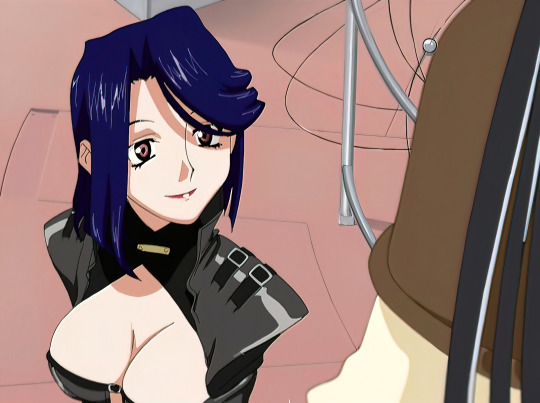

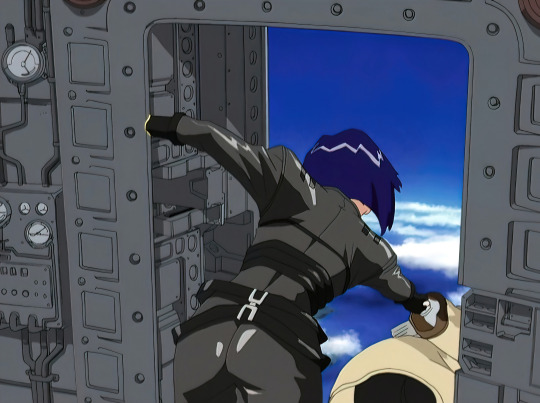

152 notes
·
View notes
Text

23 notes
·
View notes
Text

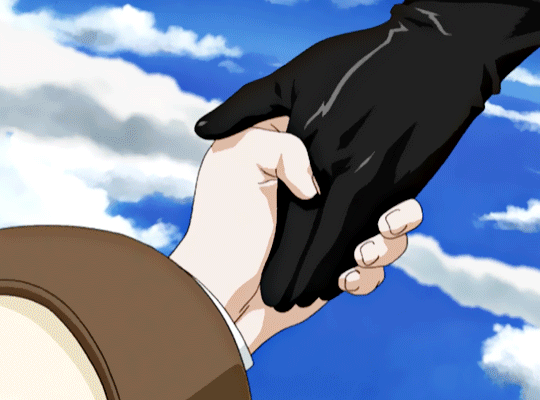
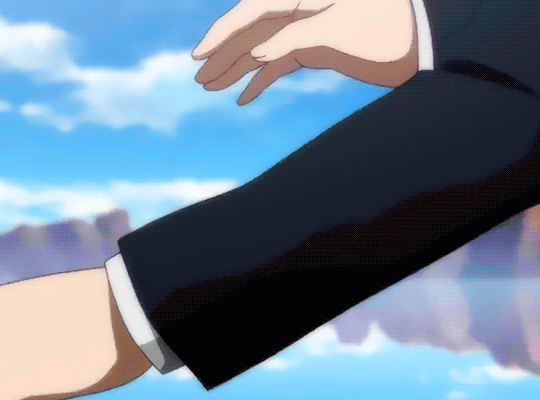


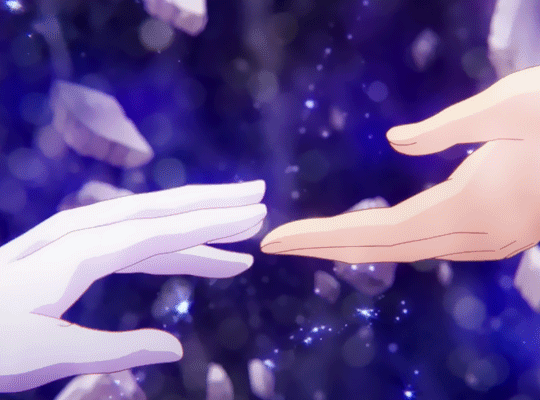
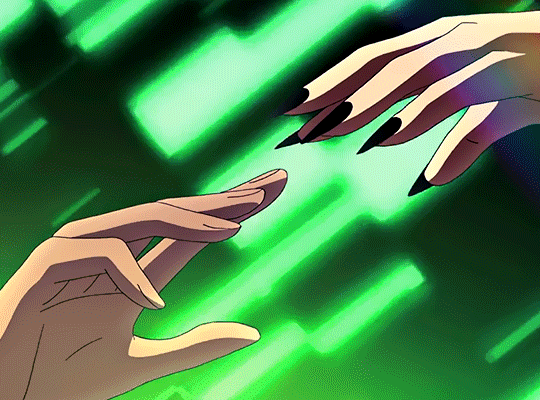
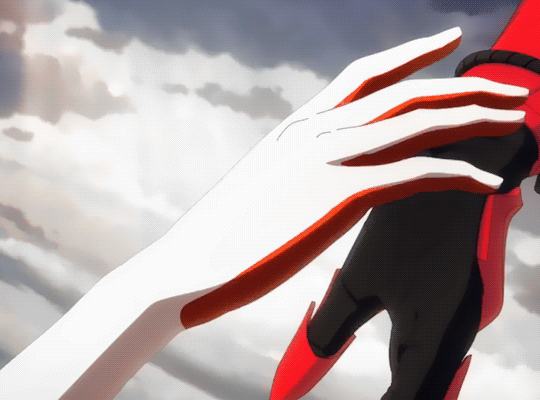
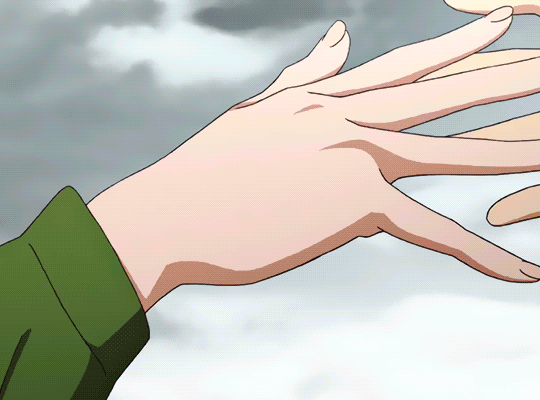


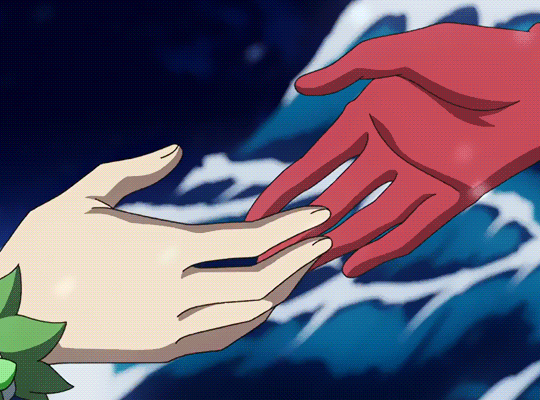


Revolutionary Girl Utena (1997) R.O.D - Read or Die (2001) Soul Eater NOT! (2014) Izetta: the Last Witch (2016) Love Live! Sunshine!! (2016) My Next Life as a Villainess (2020) She-Ra and the Princesses of Power (2020) Honkai Impact - Lament of the Fallen (2021) Otherside Picnic (2021) Love Live! Nijigasaki (2022) Love Live! Superstar (2022) Tokyo Mew Mew New (2022) Yuri is my Job! (2023) I'm in Love With the Villainess (2023)
#the girlies OWN the bottom left / top right hand composition. sorry#hands#revolutionary girl utena#read or die#soul eater not#izetta the last witch#love live#love live sunshine#my next life as a villainess#she ra#honkai impact#otherside picnic#love live nijigasaki#love live superstar#tokyo mew mew#yuri is my job#im in love with the villainess#anime#animeedit#fyanimegifs#anisource#dailyanime#dailyanimatedgifs#animangahive#shoujoaisource#gif#gifset#parallel#spop#ll anime
3K notes
·
View notes
Text

1K notes
·
View notes
Text
List of anime with lgbt themes/subtext + MAL links
(just my absolute favess. watch them just for the plot too. most are very well written)
1. Gankutsuou (transexuality, mlm)
2. Read or Die (wlw subtext, one character seems nonbinary to me)
3. Shouwa Genroku Rakugo Shinjuu (mlm HEAVY subtext, very tragic, author says it's ambiguous. i say you must be delusional to think those 2 are straight)
4. Oniisama e.... (transexuality ish, its complicated idk, HEAVY wlw)
5. Sakamichi no Apollon (very soft mlm subtext, more like what if for straights, to me it's seems like ain't no way he is not gay)
6. Revolutionary Girl Utena (wlw subtext, a classic)
7. Maria-sama ga Miteru (soft wlw subtext)
8. Hibike! Euphonium (wlw subtext)
#anime#gankutsuou#read or die#shouwa genroku rakugo shinjuu#oniisama e#sakamichi no apollon#revolutionary girl utena#maria-sama ga miteru#i have good taste trust me#hibike! euphonium
98 notes
·
View notes
Text
This scene from the first episode of the Read or Die anime is what I consider to be one of the best sequences in anime
....which is a shame because after this the whole fucking thing goes down hill and becomes boring as hell
Its such a weird thing, they knew the ROD movie was popular cos of all the cool paper stuff and were like OK SO WE'LL HAVE 3 GALS WHO CAN DO PAPER MAGIC and then proceed to have them hardly use it and just stand around and be sad and go through existential crisises and super bummers
This used to air on G4 every single night for a year, they aired it so much you could watch the entire series in one week (they seemed to only be able to afford really really mid anime or just had really bad taste?)
I fucking love love this part though, I've thought about it constantly for years and years💓💖💗Fucking perfect action scene!
11 notes
·
View notes




